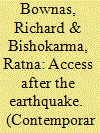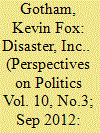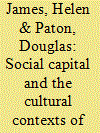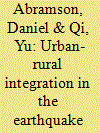|
|
|
Sort Order |
|
|
|
Items / Page
|
|
|
|
|
|
|
| Srl | Item |
| 1 |
ID:
167243


|
|
|
|
|
| Summary/Abstract |
This article examines the aftermath of the Nepal earthquakes of 2015 with special reference to their impact on marginalized communities, in particular Dalit or ‘Untouchable’ communities in Sindhupalchok District, one of the worst affected districts of Nepal. The earthquakes not only took thousands of lives and destroyed property and livelihoods, but their aftermath has revealed the webs of power that shape and limit the opportunities of different communities. Referencing the theoretical approach to access pioneered by (Ribot, J., and N. Peluso. 2003. “A Theory of Access.” Rural Sociology 68 (2): 153–181)the article proceeds to analyze the relative ‘winners and losers’ from the reconstruction process, finding a mixed picture of opportunities and barriers facing the most marginalized communities in the district.
|
|
|
|
|
|
|
|
|
|
|
|
|
|
|
|
| 2 |
ID:
116444


|
|
|
|
|
| Publication |
2012.
|
| Summary/Abstract |
This paper examines the problems and limitations of the privatization of federal and local disaster recovery policies and services following the Hurricane Katrina disaster. The paper discusses the significance of the Homeland Security Act of 2002 in accelerating efforts to devolve and privatize emergency management functions; the reorganization of the Federal Emergency Management Agency (FEMA) as a service purchaser and arranger; and the efforts by the New Orleans city government to contract out disaster recovery activities to private firms. I situate and explain these three developments in the context of recent trends toward the neoliberalization of state activities, including the privatization and devolution of policy implementation to private firms and non-governmental organizations. On both the federal and local levels, inadequate contract oversight and lack of cost controls provided opportunities for private contractors to siphon public resources and exploit government agencies to further their profiteering interests and accumulation agendas. This article demonstrates how the privatization of emergency management services and policy constitutes a new regulatory project in which the state's role has shifted away from providing aid to disaster victims and toward the management and coordination of services delivered by private contractors.
|
|
|
|
|
|
|
|
|
|
|
|
|
|
|
|
| 3 |
ID:
139222


|
|
|
|
|
| Summary/Abstract |
Social capital and leadership are critical in mobilizing collective actions to promote community and individual recovery after a natural disaster. Transformation to a better situation post-disaster, not just returning to a previous state, reflects the growing emphasis on disaster as a catalyst for change. To facilitate transformative change, the development focus at the core of this approach emphasizes empowerment through local governments and domestic civil society organizations working in the ‘bottom up’ participatory mode to enhance the resilience of vulnerable population groups. Poverty reduction and disaster risk reduction are interlinked. However, the research literature on disasters pays least attention to socially created vulnerabilities. They are ignored because of the difficulty in developing agreement on theory, and prioritizing issues quantifying them. This article investigates the impact of the cultural contexts in Myanmar and Taiwan on disaster recovery and reconstruction plans for specific disaster events in which vulnerable population groups respond to different risk governance frameworks and suggests a foundation for developing a cross-cultural, all-hazards approach to understanding the relationship between resilience and recovery in the context of large-scale Asian disasters.
|
|
|
|
|
|
|
|
|
|
|
|
|
|
|
|
| 4 |
ID:
106752


|
|
|
|
|
| Publication |
2011.
|
| Summary/Abstract |
One of the more recent movements in China's policy for periurban planning and development is the pursuit of "town and country integration" (cheng xiang yi ti hua). The officially reframed approach to planning suggests possibilities for the official reconsideration of developmental practice, but entrenched conditions of governance, land, environmental and developmental policy, and the planning profession itself constrain these possibilities. Perhaps no other context in China illustrates these constraints more dramatically than the reconstruction effort underway in Sichuan following the earthquake of May 12, 2008. Cultural, environmental and economic differences among settlements in the earthquake zone vary widely, and local and national leaders frequently mention the opportunity the recovery presents for innovative and sustainable development, but the "cataclysmic" nature of reconstruction investment, and the extremely rapid and construction-dominated approach to recovery has prevented planners from considering local conditions or alternative approaches. If the official earthquake response has served to propel urbanization along preexisting trajectories, local geographical, historical and cultural conditions nevertheless assert themselves, even if informally. The uniquely dense, dispersed and agriculturally productive Chengdu Plain has already shaped a national discourse on urban-rural relations. The expansion of Chengdu's urban region into the narrow valleys and minority ethnic settlements across the Longmen Mountains presents new and unpredictable challenges for considering how city and country are related.
|
|
|
|
|
|
|
|
|
|
|
|
|
|
|
|
|
|
|
|
|